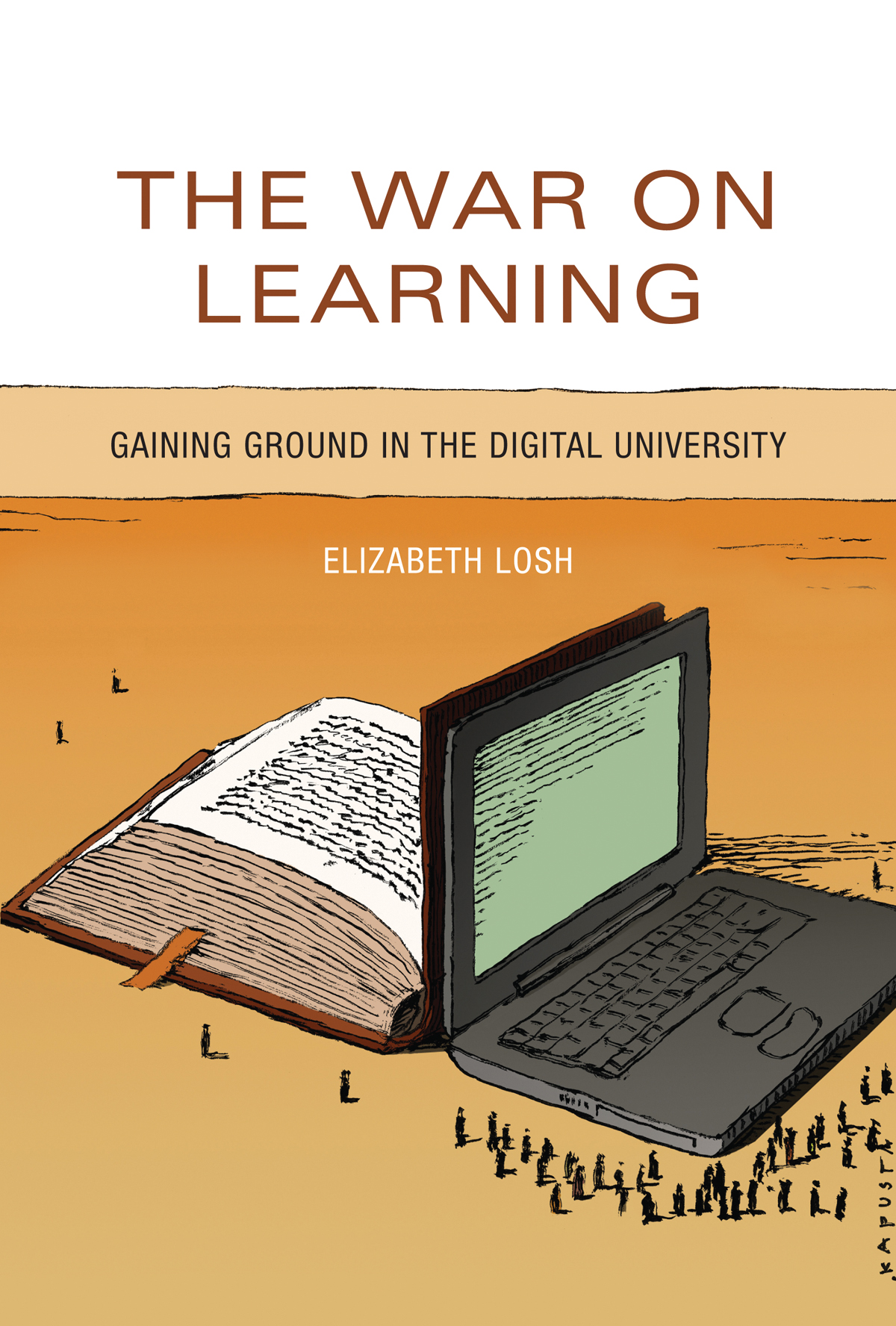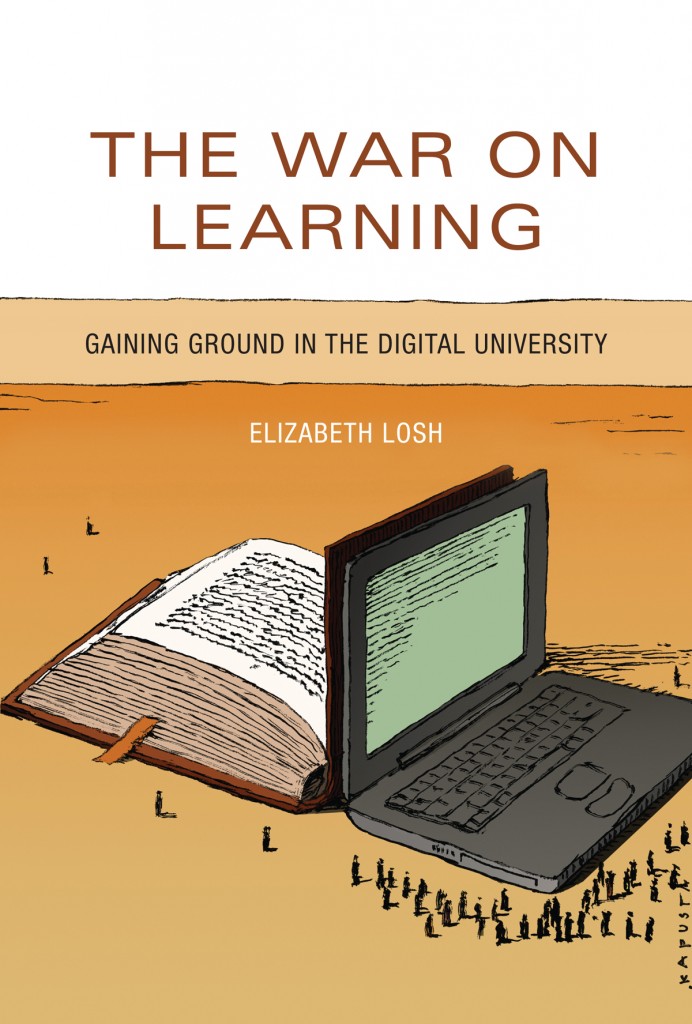
Education Technology’s Conscientious Objector
Audrey Watters, Hack Education
Review of Elizabeth Losh, The War on Learning: Gaining Ground in the Digital University (Cambridge, MA: The MIT Press, 2014). $29.95 hardcover, $20.95 e-book.
The War on Poverty. The War on Drugs. The War on Cancer. The war metaphor is often invoked to marshal resources and formulate policies in order to defeat some sort of social scourge. (Indeed, that sentence I just wrote highlights how this metaphor typically brings with it all sorts of military terminology.) As such, the title of Elizabeth Losh’s 2014 book on education technology, The War on Learning, is perhaps a little unsettling, posting “learning” as the prepositional object under attack. Why would anyone wage war on learning?!
And yet here we are, immersed in policy and media debates about the future of education, with various pronouncements about how education technology might alternately spell triumph or defeat for students, teachers, and institutions in turn. All this makes Losh’s The War on Learning an important and timely intervention as, unlike so many other recent books on the topic, the text doesn’t fuel the fire with hype, hope, or horror at the so-called ed-tech revolution.
Indeed, more typically it is the word “revolution” that is bandied about to describe the transformational promise of education technologies; “war,” not so much. “Revolution” as a metaphor for technological change tends to erase the battles and their destructiveness; it’s harder to invoke “war”—even as a rhetorical turn—without mentioning these costs.
The costs here aren’t solely to academia. It’s notable that Losh’s book is not called “The War on Higher Education,” nor, as Dana Goldstein describes her history of the teaching profession The Teacher Wars, “The War on the Professoriate.” According to Losh, we’re in the middle of a war on and about learning.
One way to read the title of Losh’s book would be, quite simply, to acknowledge the ways in which ed-tech policies, products, and practices are challenging how we learn. That is, of course, an argument that ed-tech’s advocates have long made, some with sweeping claims about the increased efficiencies and engagement that new technologies will engender. Losh is much more pragmatic. Others have described education technology as disrupting institutional power, shifting control of learning experiences away from faculty and towards students. But Losh rejects these narratives as well as an oversimplification of education—both as an institution and as an activity—and cautions against the rhetoric that increasingly describes learning as a product and not a process (seen most obviously in the push for more hardware and software in schools). This corrective is particularly crucial as this rhetoric is so frequently intertwined with efforts from tech investors and entrepreneurs to turn our public learning spaces into privatized commodities.
Losh observes that “the war on learning” is often formulated as something fought between teachers and students. No doubt, this is how controversies and concerns over most technologies in schools are routinely framed in popular discussions of education: students want to use their personal computing devices in the classroom, for example; professors ban these devices as distractions. Students are “digital natives,” comfortable and competent with new technologies; professors are Luddites. Students prefer the latest software and hardware; schools insist on outmoded learning management systems. Losh dismisses these stereotypes, contending that this focus on “professor” versus “student”—“our technologies” versus “their technologies”—is not just an all-too-neat generalization, but actually misses the point of how and why this “war” is taking shape:
I see problems both with using technologies to command and control young people into submission and with the utopian claims of advocates for DIY education, or “unschooling,” who embrace a libertarian politics of each-one-for-himself or herself pedagogy and who, in the interest of promoting totally autonomous learning in individual private homes, seek to defund public institutions devoted to traditional learning collectives. (Kindle Locations 620-623)
Losh’s book moves beyond this “us” versus “them” dichotomy, offering a necessary and nuanced take on education technologies. She also tries to move beyond the ever-so-common rhetoric of crisis—for example, fears that digital technologies will somehow destroy students’ attention spans or literacy skills—and its counterpoint, the rhetoric of disruptive innovation—proclamations that these same technologies will destroy that anachronism, the university.
Massive open online courses (MOOCs) have served as the front line of this “war on learning” in recent years. In her chapter on MOOCs, Losh explores “the rhetoric of the open courseware movement,” challenging the notion that these free online classes are really a democratizing force, making higher education available for everyone. As Losh points out, over 80% of Coursera’s students already have undergraduate degrees. Moreover, as Losh argues, “the rhetoric of MOOCs has much more to do with the ambitions of the Silicon Valley and the anxieties of the Ivy League than it does with the aspirations of the developing world” (Kindle Locations 2714-2716).
Losh observes, too, that the producers and promoters of MOOCs, as with so many other recent ed-tech endeavors, attempt turn the focus to learning—at least in the way they talk about their offerings. However, these products remain very much concerned with “content delivery” and instruction: video lectures are still lectures, even if you break them into 3 minute chunks. The vocabulary of Coursera’s founders, Losh writes, “deliberately moves the rhetorical focus from teaching to learning and often appropriates the lexicon of the ‘connected learning’ movement, despite the company’s proprietary interest in the hierarchical structure of MOOCs” (Kindle Locations 2874-2876). Framing new technologies like this is meant to assure us that these new technologies are more “student-centered,” more “personalized,” and even more liberatory than higher education currently provides. But from the Terms of Service to the honor codes, from the reliance on multiple-choice quizzes to the LMS-like platform itself, it’s clear there is very little freedom for learners here.
In her chapter on MOOCs, as she does throughout the book, Losh positions herself as both a professor and as a learner—as a student in a Coursera MOOC, for starters, and as someone who must negotiate new technologies alongside her students. Although she is highly critical of the history of ed-tech (remember Second Life? Losh explores this along with early iPod implementations, viral campus videos and more), the book is hardly a rejection of technology. As the subtitle suggests, it is committed to “gaining ground in the digital university,” that is, to building initiatives in which digital learning can flourish; but that ground must not come at the expense of either critical discourse or care. “Effective educators should be noncombatants,” Losh argues, “neither champions of the reactionary past nor of the radical future.” Instead, she maintains she is a “conscientious objector in this war on learning” (Kindle Locations 623-625).
Conscientious objectors are required to justify their opposition to war, and Losh has done so here quite thoroughly. She closes the book with six principles that could guide a new digital university moving forward, urging us to embrace new technologies not when they promise efficiency and novelty but when they can help education become “more inclusive, generative, just, and constructive” (Kindle Location 4951). And those ends require a commitment to the larger community—to scholars and to students alike.
About the Author
Audrey Watters is a journalist specializing in education technology news and analysis. Although she was two chapters into her Comparative Literature dissertation, she decided to abandon academia, and she now happily fulfills the one job recommended to her by a junior high aptitude test: freelance writer. She has written for The Atlantic, Edutopia, Fast Company, Inside Higher Ed, The School Library Journal, The Huffington Post, and elsewhere across the web, in addition to her own blog Hack Education. She is the author of the book The Monsters of Education Technologyand her next books, Teaching Machines and Reclaim Your Domain, are both due out in 2015.




'Education Technology’s Conscientious Objector' has 3 comments
July 15, 2016 @ 1:21 am Jeremy Hoffmann
Great ideas ! Speaking of which , if someone is wanting a J.J. Keller 30-F 996 , my colleagues filled a blank form here
http://goo.gl/krGMM8June 27, 2015 @ 6:30 pm Cat Videos, The War on Learning and The Power of Mindset | spectrum
[…] released by Samsung Electronics America. The War On Learning A new book by Elizabeth Losh, The War On Learning, is a worthwhile read. In this book, Losh examines current efforts to “reform” higher […]
June 22, 2015 @ 12:33 pm Chris Chelberg
I liked the article, but why are some citations in kindle locations rather than in pages? Would it be possible to provide both page numbers and kindle locations?